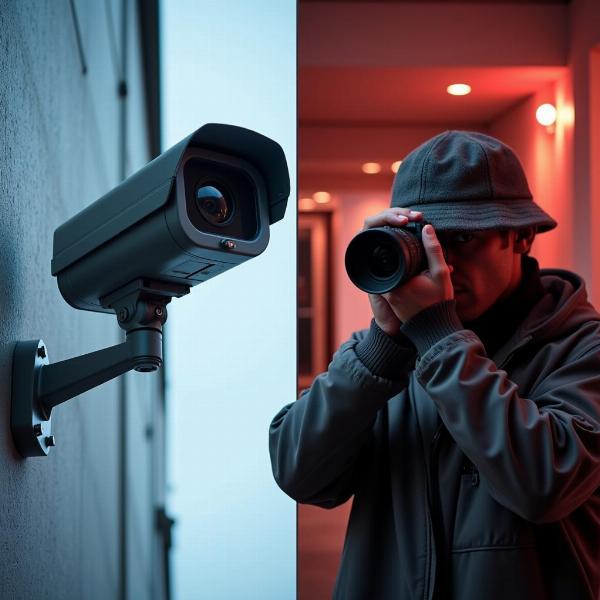Understanding the meaning of “spying” in Hindi can be nuanced, reflecting the cultural and social context. Essentially, spying involves secretly gathering information about someone or something. This act, often clandestine and unauthorized, can range from casual observation to sophisticated surveillance techniques. What constitutes spying and how it is perceived in India can vary depending on the situation. This article will explore the various Hindi words used for spying, their connotations, and the cultural context surrounding this practice.
Different Ways to Say “Spying” in Hindi
Several Hindi words convey the meaning of “spying,” each with slightly different nuances:
- Jasoosi (जासूसी): This is the most common and direct translation of “spying.” It implies a systematic and often professional act of gathering intelligence, usually for a specific purpose, such as national security or corporate espionage.
- Guptchar (गुप्तचर): This term refers to a secret agent or someone involved in clandestine operations. It carries a sense of secrecy and covert action.
- Jasoos (जासूस): This word refers to a “spy” or “detective.” It can be used in both formal and informal contexts, depending on the situation.
- Nigrani (निगरानी): This term means “surveillance” or “observation.” While not always implying malicious intent, it can refer to the act of watching someone closely, potentially leading to the gathering of information.
- Taak-jhaank (ताक-झांक): This colloquial term implies “peeping” or “snooping.” It often suggests a less formal and more casual form of spying, often associated with curiosity or nosiness.
Cultural Context of Spying in India
Spying, like in many cultures, carries a mixed perception in India. While espionage for national security is considered a necessary function, personal spying is often viewed negatively, raising ethical and privacy concerns. Bollywood films often portray spying as glamorous and exciting, but the reality can be far more complex and ethically ambiguous. Societal norms and values greatly influence how spying is perceived, making it a sensitive topic.
The Role of Technology in Modern Spying
With the advent of technology, spying has taken on new forms. Cyber spying and digital surveillance are increasingly prevalent, blurring the lines between legitimate monitoring and intrusive spying. This raises new challenges for privacy and security in India.
Legal and Ethical Implications of Spying
Spying, depending on the context, can have legal ramifications in India. Laws exist to protect individuals from unauthorized surveillance and data breaches. The ethical implications are also significant, as spying can violate trust and privacy, leading to social and personal repercussions.
What is the Difference Between Surveillance and Spying?
While the terms are often used interchangeably, a key distinction exists between surveillance and spying. Surveillance, such as CCTV cameras in public spaces, may be legal and intended for security purposes. Spying, however, typically involves secrecy and unauthorized information gathering, often with malicious intent. This distinction is important in legal and ethical contexts.
 Surveillance vs. Spying
Surveillance vs. Spying
Conclusion
Understanding the meaning of “spying” in Hindi requires considering the various terms, their nuances, and the cultural context. From “jasoosi” to “taak-jhaank,” each word carries specific connotations that reflect the nature and intent of the act. As technology evolves, the methods and implications of spying continue to change, necessitating ongoing discussions about privacy, security, and ethical boundaries. The topic of spying in India remains complex, shaped by cultural values, legal frameworks, and evolving technological landscape.
FAQ
- What is the legal definition of spying in India? The legal definition varies depending on the specific act and its context, ranging from official secrets acts to laws protecting digital privacy.
- Is it illegal to monitor employees in India? Employee monitoring is legal within certain limits defined by labor laws and data privacy regulations.
- What are the penalties for illegal spying in India? Penalties can range from fines to imprisonment, depending on the severity and nature of the offense.
- How can I protect myself from being spied on? Being aware of your digital footprint, using strong passwords, and being cautious about sharing personal information are crucial steps.
- What should I do if I suspect I am being spied on? Consult legal counsel and report your suspicions to the appropriate authorities.
- Is private investigation considered spying? Private investigation is regulated and requires adherence to specific legal and ethical guidelines.
- What is the role of intelligence agencies in India? Intelligence agencies play a vital role in national security, gathering information to protect the country from internal and external threats.
Meaning-Hindi.in is your trusted partner for professional Hindi translation services. We specialize in a wide range of translation needs, including business and commercial documents, legal and certified translations, technical manuals, website localization, educational and academic materials, and express translation services. Our expert linguists ensure accurate and culturally sensitive translations for diverse clientele. Need help with your next Hindi translation project? Contact us today at [email protected] or call us at +91 11-4502-7584. Meaning-Hindi.in is your one-stop solution for all your Hindi translation requirements.